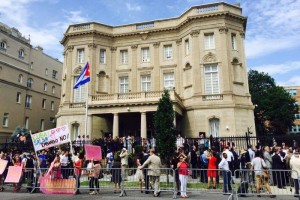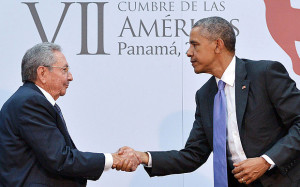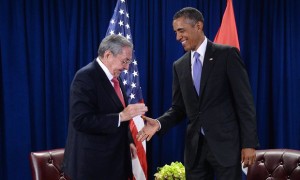Obama’s Visit to Cuba: The World Will be Watching
 Barack Obama and Raúl Castro shake hands at a bilateral meeting at the UN
Credit: Getty Images
Barack Obama and Raúl Castro shake hands at a bilateral meeting at the UN
Credit: Getty Images
On December 17th, 2014, U.S. President Barack Obama and Cuban President Raúl Castro, with the appeal of Pope Francis, both formally announced that the United States and Cuba would restore full diplomatic relations. USAID subcontractor Alan Gross and an unnamed US intelligence official in Cuba were exchanged for the release of three Cuban agents who had been jailed in the US for over 15 years. A deal most had already anticipated, the renewal of a relationship between both countries was taken many steps further when President Obama announced the reestablishment of a US embassy in Cuba, an order for Senator John Kerry to review’s Cuba’s legal designation as a State Sponsor of Terrorism and changes to travel, commerce and the flow of information to and from Cuba.

Credit: ABC News/Michael Vincent
Obama’s determination to progress forwards with Cuba was once again reflected in his February 18th 2016 announcement of his historic visit to the island planned for March 21st and 22nd, making him the first US president to travel to Havana in over 88 years since the visit of Galvin Coolidge in 1928 . Confirming his trip through several posts on Twitter, President Obama stated that “I’ll travel to Cuba to advance our progress and efforts that can improve the lives of the Cuban people” and “We still have differences with the Cuban government that I will raise directly. America will always stand for human rights around the world”.
Obama’s visit confirms that the United States remains committed to improving the relationship between the two countries. The arrival of the POTUS will be a new experience for many Cubans, as since the 1959 revolution, the visit of a US politician and yet alone President, seemed very unlikely.

Credit: AFP/Getty
Who Obama decides to visit will define his intentions. Obama’s deputy national security advisor, Ben Rhodes, told reporters that the President would be “meeting with dissidents, members of civil society, including those who certainly oppose the Cuban government’s policies”. Josefina Vidal, the director of U.S. affairs for the Cuban Foreign Ministry has also issued a statement outlining that “Cuba is open to speak to to the US government about any topic, including human rights”.
Yet, many Cuban Americans will be watching every move that Obama makes. Several have opposed US engagement with the Castro government with Senator Robert Menendez, a Democrat of New Jersey stating that Obama’s visit will only be rewarding an oppressive regime that “to this day has not [taken] one substantial step toward transparent democratic elections, improved human rights, freedom of assembly or the ability to form political parties and trade unions in Cuba”.
Republican candidates such as Marco Rubio and Ted Cruz have also announced that Obama’s visit will be a grave mistake. Mr. Cruz said that “Mr Obama would be acting as ‘an apologist’ and demonstrating ‘weakness and appeasement’ to America’s enemies”. Senator Marco Rubio, urged the President to reconsider his trip arguing that it will be “counter productive and damaging to national security agents” and sending the message “to the oppressed Cuban people that you stand with their oppressors”.

Credit: Getty Images
Cubans citizens, in Cuba, will also be paying close attention to the President’s visit. Yoani Sánchez, the renowed Cuban blogger who has achieved international fame through her blog Generación Y, has also reacted on behalf of her people saying that they will react to his visit with “joy and relief” and that the only way for Obama to affect real change and give hope to Cubans will be by letting them know that the “material and moral misery that surrounds them is not the responsibility of the White House [but rather] the best way in which Obama can transcend Cuba’s history is by making it clear that the perpetrators of the drama we are living are here, in the Plaza de la Revolución, in Havana”.
No matter one’s stance, background or opinion, many will be watching Obama’s March 2016 visit to Cuba. The President’s clear exercise in soft power will continue to be scrutinized and reviewed, with the continued development of relations between the two nations.
